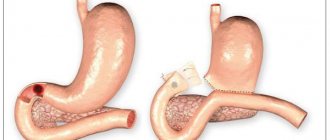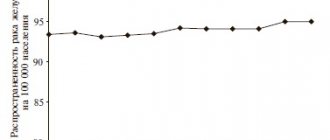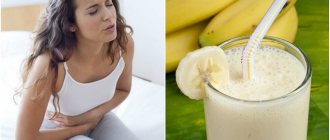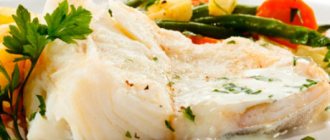A stomach ulcer, like a duodenal ulcer, is a serious disease that affects people of any age, and is usually not completely cured, becoming chronic. That is, you will need to follow a certain diet throughout your life so as not to provoke attacks. What about coffee? Is it possible to drink coffee if you have a stomach or duodenal ulcer? Recommendations from specialists vary depending on the characteristics of the disease in individual patients.
Can coffee cause ulcers?
Coffee, as a drink, does not cause ulcers if you drink it in small quantities and follow the basic principles of sensible nutrition. But it can contribute to the development of the disease (in the beginning, problems with heartburn usually arise; if you are not careful, it can lead to gastritis, and if you do not take action, only then does an ulcer appear).
That is, at the first signs of problems with the digestive system and the appearance of pain and discomfort, especially if they occur after drinking coffee, you need to carefully reconsider your diet.
Do not drink coffee on an empty stomach: with constant consumption, it greatly increases the risk of ulcers.
IBD and alcohol
One of the most popular questions from patients (after “What to eat?”) is “What can I drink?” Similar questions are asked by patients with a mild course of the disease without significant symptoms or after achieving remission.
What do we know about alcohol in IBD? Has any research been done on this topic? Oddly enough, they were carried out (and quite large and convincing).
In 2022, the results of the EPIC study were published, which included 262,451 participants (Bergmann MM. et al., 2017). Alcohol consumption by study participants was assessed by quantity (not drinking, former, low, moderate, high alcohol consumption), taking into account norms for men and women. Since follow-up (i.e., since 1993), ulcerative colitis was newly diagnosed in 198 participants, and Crohn's disease in 84 people. The statistical analysis showed that alcohol consumption does not in any way affect the likelihood of developing ulcerative colitis and Crohn's disease.
These results were later confirmed (though only for ulcerative colitis) by a meta-analysis of clinical studies, which statistically assessed the results of 9 studies examining alcohol as a risk factor for IBD. The result is the same - alcohol consumption is not a risk factor for ulcerative colitis.
But chronic alcohol abuse (alcoholism) increases the risk of IBD , as convincingly demonstrated by a study by Chinese authors. They analyzed data from a 10-year follow-up of nearly 58,000 cases of hospitalized individuals diagnosed with alcohol intoxication, comparing them with a control group that did not abuse alcohol. The risk of identifying new cases of IBD was 3.17 times higher among people suffering from alcoholism, of which 4.4 times for Crohn's disease and 2.33 times for ulcerative colitis.
“Thank you, doctor,” the patient will say, “but I would like to be absolutely sure that alcohol will not provoke an exacerbation of my disease.”
Such fears are not unfounded. It is known that ethanol, which is part of alcoholic beverages, reduces the activity of intestinal immune cells and suppresses the production of certain cytokines, and also (which is most important for IBD!) increases the permeability of the intestinal wall. Thus, in theory, it is possible to harm the intestines by drinking alcohol, but the extent of the negative impact of ethanol is still unknown.
Research does not provide a clear answer to the question of how alcohol affects the course of the disease. On the one hand, their number is limited, and the number of subjects rarely exceeds several dozen people. On the other hand, most of these studies are based on surveys, including retrospective ones.
However, some interesting data is available for analysis. In 2004, Jowett et al published a study of 191 patients with ulcerative colitis in clinical remission. During the year, patients were periodically surveyed about the amount and nature of foods and drinks consumed, including alcohol. After 12 months, exacerbation of the disease was observed in 52% of patients.
It was found that drinking alcohol in moderate doses did not increase the risk of exacerbation, while taking high doses of alcohol increased the risk of exacerbation of ulcerative colitis by 2.71 times. A limitation of the study was the lack of precise information about dangerous and safe doses of alcohol.
Another interesting work was carried out in the USA. 14 patients with ulcerative colitis and Crohn's disease in remission, as well as 7 healthy volunteers, took part in a study that assessed the effect of wine consumption on the course of the disease. For a week, each patient drank 1-3 glasses of dry red wine per day (approximately 0.4 g of ethanol per 1 kg of body weight). Before and after the study, blood tests, stool tests for fecal calprotectin, and intestinal permeability were assessed. There were no cases of exacerbation of the disease during the study. Patients showed a significant increase in small intestinal (in Crohn's disease) and large intestinal (in ulcerative colitis) permeability. Since intestinal permeability plays an important role in the development of IBD and can generally be considered an early marker of inflammation, it is likely that regular consumption of wine, even in small quantities, will lead to an exacerbation of the disease. At the same time, the majority of participants before the start of the study had an increased level of fecal calprotectin, that is, it is possible that the remission of the disease was only clinical.
Interestingly, a week after daily consumption of wine, the level of calprotectin in patients with IBD significantly decreased.
Finally, one of the latest studies, also performed in the United States at the end of December 2022, assessed digestive symptoms in individuals who drink alcohol. Of 90 patients with inactive IBD, 62% regularly drank alcohol in varying amounts, which is broadly comparable to the nation as a whole (61% of Americans drink occasionally). Of the total number of alcohol drinkers, 75% of patients with IBD noted that they subsequently experienced a worsening of symptoms (abdominal pain, loose stools, bloating, etc.). This study was again based on a patient survey, which limits its value.
The question remains unanswered: “Which alcohol is less harmful to the intestines?” Large studies assessed the use of alcohol in general, while smaller studies assessed the use of red wine.
It is likely that the most important factor will be the total amount of ethanol in the daily “glass” rather than its type.
After analyzing the results of clinical studies, it becomes clear that drinking alcohol with IBD is possible, but “in moderation” (infrequently and in moderate quantities). Constant consumption of alcohol, especially in high doses, can provoke an exacerbation of the disease.
It is not recommended to drink alcohol at the same time as certain medications taken by patients with IBD. Severe drug-induced liver damage may occur with concomitant use of metronidazole and ethanol. Taking other medications (mealazines, azathioprine/mercaptopurine, steroid hormones) does not exclude the possibility of occasional drinking of alcohol in small doses.
How does coffee affect the body for stomach and duodenal ulcers?
Caffeine stimulates the secretion of gastric secretions. If you drink coffee on an empty stomach, the juice is released and there is nothing to digest. Increased acidity and irritation of the walls lead to ulcers.
But it's not just the caffeine, otherwise you could just drink decaf coffee. Coffee also suppresses pepsin enzymes, and people with ulcers already have low levels of these enzymes. That is, coffee can make things much worse.
The grounds in coffee, even the smallest ones, quite irritate the walls of the stomach and intestines.
How to drink coffee if you have a stomach or duodenal ulcer?
Remember the basic recommendations:
- Do not drink coffee on an empty stomach;
- Do not drink strong black coffee;
- Do not drink more than 2 cups of coffee per day.
Separately, it is worth mentioning instant coffee for ulcers. Instant coffee with or without caffeine, even the most expensive, organic and seemingly high-quality, is strictly contraindicated! It contains dyes, emulsifiers, flavors, taste and smell enhancers, preservatives and similar chemicals, which have an extremely negative effect on the gastrointestinal tract.
In a state of confident remission, you can sometimes allow yourself weak natural coffee with milk. It should not be hot or ice cold, prefer warm coffee. Alternatively, you can prepare espresso or ristretto (they contain a minimal amount of caffeine) and dilute it in a cup with warm water or milk.
Do not let coffee grounds get into the cup. Use either special filters or a coffee machine. You will have to give up Turkish coffee, or filter it carefully (but it has a lot of caffeine, so this is still not the best option).
Proper diet for stomach ulcers
21.04.2021
Abdominal pain (more or less above the navel ), burning sensation, like heartburn ? Or maybe nausea , belching or even vomiting? These are the most common symptoms stomach ulcers . It affects about 10% of society - according to statistics, this problem affects men more than women. Living under constant stress, smoking cigarettes, drinking a lot of coffee, frequent irregular and “hungry” meals - you increase the likelihood that you will also suffer from peptic ulcers . Currently, not only adults suffer from it, regardless of lifestyle, but also children are increasingly suffering from peptic ulcer disease .
Peptic ulcer
When the protective layer of the mucous membrane of the stomach and intestines ulcers and therefore the unpleasant diseases described above can appear And how is this protective layer broken?
Peptic ulcers can be caused by bacteria (more precisely, Helicobacter pylori), but this is not the only cause. Ulcers can also occur as a result of taking certain medications - most commonly steroids as they increase acid secretion, stress and food allergies . Treatment of peptic ulcer disease largely depends on its stage. If the bacterium Helicobacter pylori is present, treatment is based on eliminating it, as well as changing the diet or supplements and medications used. Lifestyle changes are also recommended.
Ulcer diet
The diet used for peptic ulcer disease consists of limiting the consumption of acids (as they negatively affect the mucous membrane), protecting and improving the condition of the mucous membrane of the stomach and intestines , as well as stimulating the immune system and preventing the proliferation of pathogenic bacteria. Treatment of peptic ulcers can be supported by herbs that have antibacterial, anti-inflammatory, sedative properties and have a protective effect on the mucous membrane.
The diet should be rich in fruits and vegetables, which are an excellent source of vitamins and protect our body from infections. Among the vegetables, the following deserve special attention: cabbage, carrots, cucumbers, broccoli, onions and green leafy vegetables, and recommended fruits and berries: apples, apricots, bananas, blueberries, cherries, pears, mangoes, papaya, avocados and red grapes. However, it should be remembered that sweet, fully ripe fruits have a more soothing effect on the digestive system than sour ones. Our daily menu should also be enriched with legumes, seeds, oats, barley, as well as the addition of honey and extra virgin olive oil.
If you have peptic ulcers , it's especially important to drink the right amount of fluids—at least 8 large glasses of water, herbal teas, or perhaps juice, naturally sourced and not from a box. Drink only between meals, not during meals, to avoid diluting your digestive juices. Liquids must also be at the right temperature - very warm ones irritate ulcers .
Among the herbs, elm bark powder is especially recommended, which, when consumed in the evening, creates a protective layer that protects the mucous membrane of the gastrointestinal tract from the harmful effects of acid. You can also use herbs and spices such as calendula, dandelion root, echinacea, chamomile, marshmallow root, meadowsweet, cinnamon, cloves, garlic, ginger, licorice, parsley or turmeric to combat peptic ulcers . Most are freely available in grocery stores, health food stores, or herbal stores.
It is recommended to consume in smaller portions, but more often. You should also avoid eating before bed - late in the evening. A person with a peptic ulcer should ensure that their diet contains as little salt as possible, and should also eliminate (or significantly limit) foods and substances such as caffeine (found in tea, coffee, chocolate, carbonated drinks), stimulating acid secretion. Stomach acid, dairy products that increase stomach , alcohol, carbonated drinks, refined grain products, refined sugar, cigarettes. You should eliminate fried foods and oils from your diet - except for extra virgin olive oil and possibly medications.
If a stressful lifestyle may have caused peptic ulcers , it is recommended that you change your lifestyle or at least try other stress-reducing techniques, such as yoga, meditation or tai chi.
Published in Gastroentorology Premium Clinic
Conclusion
- Coffee does not cause peptic ulcers, but together with other factors it can contribute to its development.
- It is forbidden to drink coffee on an empty stomach, instant coffee, hot coffee, or during the acute phase of the disease.
- For chronic stomach and duodenal ulcers, natural coffee is acceptable, but only after meals, with milk or diluted with water.
- Always consult your doctor: is it worth drinking coffee in small doses at this stage of the disease? A specialist can better see the dynamics of the disease. And of course, listen to your own feelings.







